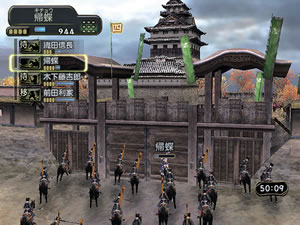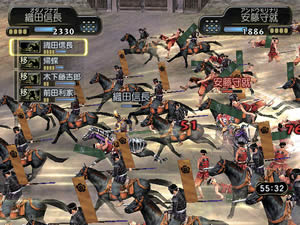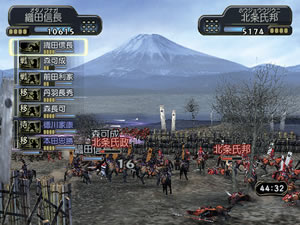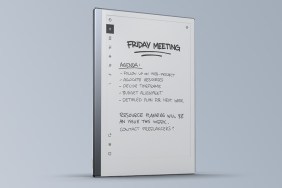The art of warlords.
When it comes to epic combat, few do it like Koei. With the famed Romance of Three Kingdoms and Dynasty Warriors franchises under their belt, they’ve got a solid reputation for making large-scale warfare intuitive and relatively popular. In fact, the biggest gun in the company’s war chest is probably the Kessen series, whose gameplay lies somewhere between the other two, a solid mix of action and strategy.
The latest in the series, Kessen III, really toes the action/strategy line by breaking up the gameplay into two distinct segments. It works well enough, although despite its epic feel and layered strategy, the game tends to fall victim to repetitive, overly simple gameplay.
Kessen III tells the story of Oda Nobunaga and his quest to unite all of Japan. This might seem a little weird for those who only know the demonic Nobunaga popularized as the villain in Capcom’s Onimusha games, but as one of the great unifiers of Japan, Nobunaga probably wasn’t that bad of a guy. In any case, you’ll lead him and his commanders against the warlords of Japan.
The gameplay is broken into strategic planning and battle action sequences, with some snazzy, cinematic storytelling pulling it all together. The initial phase is Planning, in which you’ll be able to make adjustments to your commanders’ equipment, accessories and troops. Items can be earned in the field or even bought from local merchants with the gold you’ve accumulated by conquering areas. The huge assortment of goodies lends some strategy to the game, as your choices here can affect the outcome of the next battle. Send a ninja specialist into battle with a monk unit at his back and things could get dicey fast.
You’ll also have to decide which battle to take on next, often choosing from up to four missions at any given time. Some battles are experience fodder for your generals, while others exist to advance the story. Each battle also carries a certain difficultly level and some are critical. Take on too many tough battles before a critical conflict and your generals will be worn down. Skip too many minor battles and your men won’t gain enough experience points. You have to be smart about which battles to fight.
After doing some basic recon and getting your mission briefing (via the War Council phase), you choose your units and send “em to their fate. You have to be picky here, too. If your best warriors are used too frequently, they won’t be in any condition to fight the critical battles. If you’re sure to meet some cavalry, it’s probably not a good idea to send a force of archers.
Just before actually hopping into battle, you can issue orders. Since you can only act as one general at a time, it is usually a good idea to issue an initial battle plan for the whole crew. This way, your forces will act on their own without you having to constantly switch control on the fly. It’s too bad you can’t set waypoints to give them a path to travel, but you can make adjustments to the battle plan quickly and easily.
 When you take all these strategic elements as a whole, you wind up with a multi-tiered system that offers some decent depth. However, the Planning is only part of the ordeal.
When you take all these strategic elements as a whole, you wind up with a multi-tiered system that offers some decent depth. However, the Planning is only part of the ordeal.
The meat of the game comes in the action-oriented Battle phase.
Here, you’ll take charge of any group of units and slam them into the enemy. Fighting isn’t very complex, mostly involving running up to the opposing force and mashing the attack button. In some cases, like when you’re leading a mounted force, you might even be able to get through a level without pressing any buttons at all. There’s also an option to perform a powerful special attack, but doing so leaves your forces vulnerable for a few seconds and runs the risk of knocking down your own men.
Unit commanders can also execute special abilities, which provide benefits such as increased allied attack strength, decreased enemy defense, or increased unit speed. They can further use the Rampage ability to jump directly into the battle, Dynasty Warriors style, for some crazy third-person button-mashing.
While it’s interesting to see if your strategy will hold up, the actual battle segments tend to get repetitive quickly and boil down into the same thing time and again. Army A runs into Army B, you mash the attack button hoping to land a knockback move, and then follow up with a special attack. Rampaging helps shake things up a bit, but since you’re still just running around mashing buttons, it feels much like the rest of the action bits. Remember all that strategizing you thought you were doing during the Planning phase? Well, it doesn’t seem to make a huge difference when you’re just ramming your guys into their guys.
 The only thing to really break up the monotony is the occasional cutscene. Kessen III really goes for the full storytelling experience and you’ll spend plenty of time watching Nobunaga develop from a young upstart to a powerful, seasoned warrior.
The only thing to really break up the monotony is the occasional cutscene. Kessen III really goes for the full storytelling experience and you’ll spend plenty of time watching Nobunaga develop from a young upstart to a powerful, seasoned warrior.
Graphically, Kessen III puts on a satisfactory show. Plenty of characters and units are tossed onto the large battlefields without much of a performance issue, which is nice. Still, the character models show some age and the environments tend to use flat, simple textures. War is a bit bland, it seems.
Thankfully, the audio includes Japanese language material for a more authentic feel. Naturally, there’s an option for English audio, but not surprisingly these voiceovers tend to be cheesy and awkward.
Lots of options and simple control makes Kessen III about as accessible as war strategizing can get. Unfortunately, the action is pretty repetitive and the button mashing grows tedious, leading to only a two-star general.
-
Plenty of strategic options
-
Tons of items
-
Simple control
-
Too simple, in fact
-
Repetitive gameplay
-
Battles lack excitement









